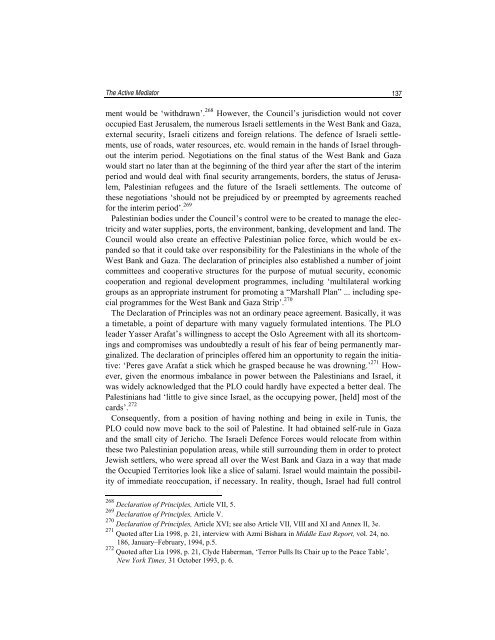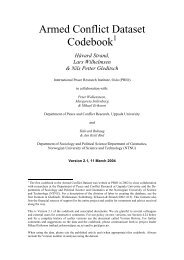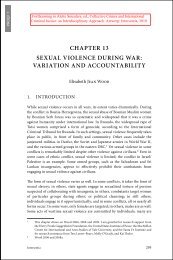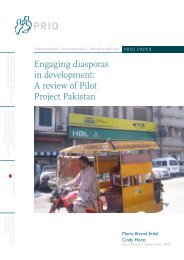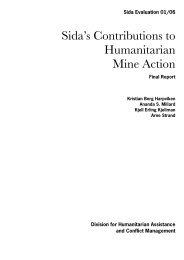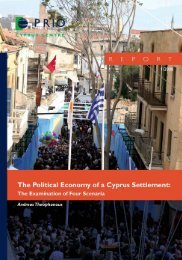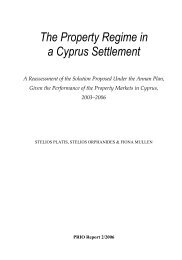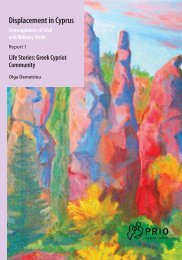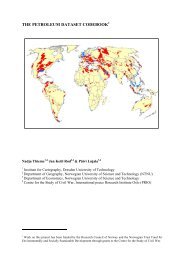Peacemaking Is a Risky Business - PRIO
Peacemaking Is a Risky Business - PRIO
Peacemaking Is a Risky Business - PRIO
You also want an ePaper? Increase the reach of your titles
YUMPU automatically turns print PDFs into web optimized ePapers that Google loves.
The Active Mediator137ment would be ‘withdrawn’. 268 However, the Council’s jurisdiction would not coveroccupied East Jerusalem, the numerous <strong>Is</strong>raeli settlements in the West Bank and Gaza,external security, <strong>Is</strong>raeli citizens and foreign relations. The defence of <strong>Is</strong>raeli settlements,use of roads, water resources, etc. would remain in the hands of <strong>Is</strong>rael throughoutthe interim period. Negotiations on the final status of the West Bank and Gazawould start no later than at the beginning of the third year after the start of the interimperiod and would deal with final security arrangements, borders, the status of Jerusalem,Palestinian refugees and the future of the <strong>Is</strong>raeli settlements. The outcome ofthese negotiations ‘should not be prejudiced by or preempted by agreements reachedfor the interim period’. 269Palestinian bodies under the Council’s control were to be created to manage the electricityand water supplies, ports, the environment, banking, development and land. TheCouncil would also create an effective Palestinian police force, which would be expandedso that it could take over responsibility for the Palestinians in the whole of theWest Bank and Gaza. The declaration of principles also established a number of jointcommittees and cooperative structures for the purpose of mutual security, economiccooperation and regional development programmes, including ‘multilateral workinggroups as an appropriate instrument for promoting a “Marshall Plan” ... including specialprogrammes for the West Bank and Gaza Strip’. 270The Declaration of Principles was not an ordinary peace agreement. Basically, it wasa timetable, a point of departure with many vaguely formulated intentions. The PLOleader Yasser Arafat’s willingness to accept the Oslo Agreement with all its shortcomingsand compromises was undoubtedly a result of his fear of being permanently marginalized.The declaration of principles offered him an opportunity to regain the initiative:‘Peres gave Arafat a stick which he grasped because he was drowning.’ 271 However,given the enormous imbalance in power between the Palestinians and <strong>Is</strong>rael, itwas widely acknowledged that the PLO could hardly have expected a better deal. ThePalestinians had ‘little to give since <strong>Is</strong>rael, as the occupying power, [held] most of thecards’. 272Consequently, from a position of having nothing and being in exile in Tunis, thePLO could now move back to the soil of Palestine. It had obtained self-rule in Gazaand the small city of Jericho. The <strong>Is</strong>raeli Defence Forces would relocate from withinthese two Palestinian population areas, while still surrounding them in order to protectJewish settlers, who were spread all over the West Bank and Gaza in a way that madethe Occupied Territories look like a slice of salami. <strong>Is</strong>rael would maintain the possibilityof immediate reoccupation, if necessary. In reality, though, <strong>Is</strong>rael had full control268 Declaration of Principles, Article VII, 5.269 Declaration of Principles, Article V.270 Declaration of Principles, Article XVI; see also Article VII, VIII and XI and Annex II, 3e.271 Quoted after Lia 1998, p. 21, interview with Azmi Bishara in Middle East Report, vol. 24, no.186, January–February, 1994, p.5.272 Quoted after Lia 1998, p. 21, Clyde Haberman, ‘Terror Pulls Its Chair up to the Peace Table’,New York Times, 31 October 1993, p. 6.


